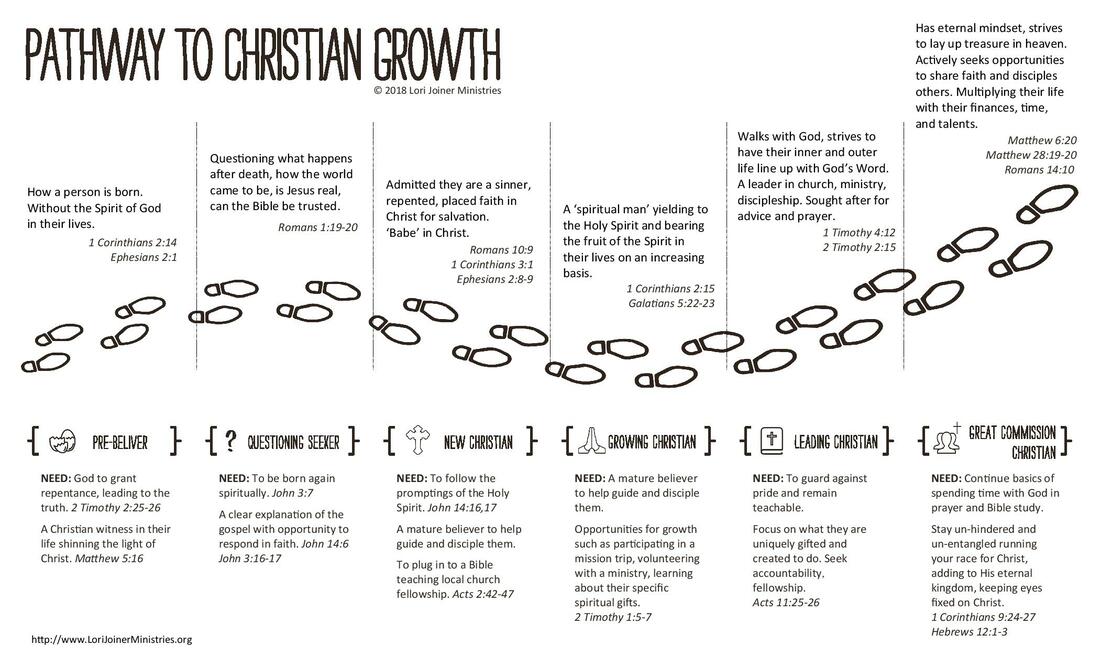|
I recall as young discipler meeting with three women for regular discipleship. We were just about to start our second semester of discipleship when one gal nervously spoke up.
“Lori, I wish we could just talk about how we are doing during this time.” Another gal said, “I wish the time was not so rushed.” The other gal, “Can we talk about anything else besides the Bible sometimes?” I was a little taken aback. Didn’t they appreciate all the time I poured into my Bible lessons with them? Did they not see how much scripture I had led them to memorize? Didn’t they appreciate the gospel training I had taught them so they could reach others for Christ? I had thought everything was OK. I now realize how much courage it took them to speak up and suggest changes. As I evaluated my discipleship efforts later that evening, I realized how task driven my discipleship had been. Our time full of scripture memorization, check-off lists and answers to a training manual we were going through along with a Bible study. I made numerous adjustments to my discipleship approach based on their feedback. As I grew as a discipler, our relationship deepened as friends. I began to start the time with small talk, just casually asking how they were doing. We either did the training manual or the Bible study but no longer both in the same meeting. I now knew what they were dealing with in their personal lives (not just spiritually), therefore our prayers together we much more heartfelt. I even scrapped the discipleship content one week. We made dinner together instead and I taught them one of my favorite recipes! Your disciple may not feel the freedom to suggest changes that would enhance your time together. So why not build in a regular evaluation time, (twice a year perhaps) to have an open, honest conversation about your regular time together? Just say, “Next week when we meet, I would love for us to talk about how our discipleship time and relationship is going. What suggestions or ideas you may have to enhance the time moving forward?” Below are some suggested questions. Discussion Topics for Discipleship Evaluation 1. What I have enjoyed the most about our time together is ... 2. What I would like to adjust as we move forward is ... 3. Questions and topics that I hope we can cover in the future are ... 4. Other issues I would like to talk about are … My hope is that as both of you share ideas, suggestions, thoughts and feelings about your time together, your relationship with deepen and topics perhaps you both felt awkward bringing up would be discussed. It takes humility and character to listen, adjust and improve. When the women we are meeting with feel like they can share ideas (topics of study in the future, hurt feelings, wanting a challenge, etc.), you both grow to new depths with the Lord and each other. P.S. I have a form pre-made for this inside my free Discipleship Starter Kit. See page 16 for Discipleship Evaluation for Both the Discipler and Disciple.
0 Comments
Recently I ate lunch with a group of women who serve in the women’s ministry at their church. We were discussing the details of me speaking at their upcoming women’s retreat.
As I met each lady at the table, one made a mention that she had gone through my “Start Here" Bible study. After lunch, I asked her to share with me the details of how she had been connected to my book. She went on to explain how a friend's invitation led her to church. Toward the end of the sermon, the pastor asked if anyone would like to come forward, pray and place their faith in Christ. When she heard that invitation, something stirred inside her heart. She felt the need to walk forward, pray, ask Jesus to forgive her sins and trust Him for eternal life. Afterward, the woman who brought her to church, along with another, began to meet with her weekly using my book, "Start Here: Six Foundational Lessons for Growth in Christ." She said, “Lori, that Bible study helped me start my walk with God. I don’t know where I’d be had those two ladies not stepped in and swooped me up!” Consequently, her story reminded me of one of my favorite passages in scripture from Acts 17:26-27. “From one man he made every nation of men, that they should inhabit the whole earth; and he determined the times set for them and the exact places where they should live. God did this so that men would seek him and perhaps reach out for him and find him, though he is not far from each one of us.” These verses teach us that: ● God created mankind. He is our creator and has an order to his creation -- it is not haphazard or by chance. ● God determined the times set for them, meaning he determined when a person would live. This means if they should be on earth now, or back in the 1800s, the 1500s, or even in the future. ● God determined the exact places they should live. He decides if a person is born here in the United States, in the Philippines, in South America, etc. But why? Why be so careful, so exact as to when we would live and where? Well, scripture tells! So that we would seek him and reach out for him and FIND HIM. God, knew the best set of circumstance for each individual person to come to know him personally. For me, the best set of circumstances to come to know him were: being born in 1972 here in the United States. He knew the best time for your grandparents to know him -- where they should live and in what country. The same for your ancestors and the same for your children and grandchildren in the future. He sets it up so that we are in the best possible set of circumstances for salvation and to be with him for eternity. And so it is with the women around us. Might it be that the women around us are here now because God knows their path will cross yours? That God knew you would be reading books and blogs about discipleship and you would catch a vision for your life being used by God to further the Great Commission? Throughout the book of Acts, men and women are sacrificing, some even their very lives, to spread the gospel and disciple young believers. Today, you and I are carrying on that work! One by one, we are taking personal responsibility to pass on our faith and disciple others in the Christian faith. Make your prayer today— “Lord, you have put people on earth, in my surrounding area, to cross paths with mine so I can help them come to know you and grow in you. Lord, who can I swoop in on and help today?” After a person places their faith in Christ, they then begin a lifelong journey of spiritual growth and maturity. As a person learns more about God and His Word, and spends time in prayer and fellowship with other believers, they grow in Christlikeness.
Not only is this process lifelong, but it can often be up and down, forward and backward. It can even side to side! But take heart … over time, the big picture of our lives should be one of spiritual growth and maturity. I like what Paul says in Galatians 4:15, that he feels like he is, “In the pains of childbirth until Christ is formed in you …” He was desperate for these young, new believers in Galatia to grow and mature in their new walk with God. The above diagram shows six steps along the Pathway to Christian Growth. Understanding each step can greatly help a person know where they are at today. More importantly, it helps understand how to continue to grow for the future. 1. The Pre-Believer This is how a person is born, without the Spirit of God in their lives. 1 Corinthians 2:14 — “The person without the Spirit does not accept the things that come from the Spirit of God …” Ephesians 2:11 — “As for you, you were dead in your transgressions and sins.” How to Help to Move Forward:This person needs God to grant them repentance, lead them to the truth, and help them come to their senses (2 Timothy 2:25-26). Also helpful would be a solid Christian witness in their life shining the light of Christ and sharing the gospel. 2. Questioning Seeker This person is questioning. What happens after death? How the world come to be? Is Jesus real? Can I trust the Bible? God is revealing Himself to them through creation. Romans 1:19-20 — “Since what may be known about God is plain to them, because God has made it plain to them. For since the creation of the world God’s invisible qualities — his eternal power and divine nature — have been clearly seen, being understood from what has been made, so that people are without excuse.” How to Help to Move Forward:This person needs to be born again spiritually (John 3:7). A Christ follower in their path is certainly helpful to give a clear explanation of the gospel and an opportunity to respond in faith (John 14:6). 3. New Christian This person has repented of their sins and placed their faith in Christ (not in good works or being a good person) for salvation and eternity in heaven with God. They are born again and saved. The Bible calls them infants in Christ or a ‘babe’ in Christ. Romans 10:9 — “If you declare with your mouth, ‘Jesus is Lord,’ and believe in your heart that God raised him from the dead, you will be saved.” Ephesians 2:8-9 — “For it is by grace you have been saved, through faith — and this is not from yourselves, it is the gift of God — not by works, so that no one can boast.” 1 Corinthians 3:1 — “Brothers and sisters, I could not address you as people who live by the Spirit but as people who are still worldly — mere infants in Christ.” How to Help to Move Forward:Follow the promptings of the Holy Spirit (John 14:16, 17). A mature believer is also helpful in guiding and disciplining while helping them plug into a Bible-based local church. 4. Growing Christian This person is no longer an infant in Christ but a ‘spiritual man’ growing in their ability to resist temptation. They are yielding to the Holy Spirit and also bearing the fruit of the Spirit in their lives on an increasing basis. 1 Corinthians 2:15 — “The spiritual man makes judgments about all things, but he himself is not subject to any man’s judgement.” Galatians 5:22-23 — “But the fruit of the Spirit is love, joy, peace, forbearance, kindness, goodness, faithfulness, gentleness and self-control. Against such things there is no law.” Help to Move Forward:This person needs to be discipled and to ask for and accept opportunities for growth. This includes participating in missions, volunteering with a ministry and learning about their specific spiritual gifts. 5. Leading Christian This person walks with God, studies the Bible consistently and is an example to others. They are a leader in the church and ministries. They are often the ones people go to for advice, prayer and wisdom in different aspects of life. This person is likely a discipler, a Bible study leader, a ministry worker. 1 Timothy 4:12, 13 — ” Don’t let anyone look down on you because you are young, but set an example for the believers in speech, in conduct, in love, in faith and in purity. Until I come, devote yourself to the public reading of Scripture, to preaching and to teaching.” 2 Timothy 2:15 — ” Do your best to present yourself to God as one approved, a worker who does not need to be ashamed and who correctly handles the word of truth.” Help to Move Forward:This person needs to guard against pride. More people are seeking their wisdom and they move into more positions of leadership. They need to remain teachable and focus their time on what they are uniquely gifted and created to do. They need to seek accountability and fellowship. 6. Great Commission Christian This person lives with an eternal mindset and strives to layup treasure in heaven. They purposefully seeks opportunities to share their faith in Christ and disciples others. They seek to multiply their life with their finances, time and talents. Matthew 28:18-20 — “Then Jesus came to them and said, ‘All authority in heaven and on earth has been given to me. Therefore go and make disciples of all nations, baptizing them in the name of the Father and of the Son and of the Holy Spirit, and teaching them to obey everything I have commanded you. And surely I am with you always, to the very end of the age.’” Hebrews 12:1-3 — “Therefore, since we are surrounded by such a great cloud of witnesses, let us throw off everything that hinders and the sin that so easily entangles. And let us run with perseverance the race marked out for us, fixing our eyes on Jesus, the pioneer and perfecter of faith. For the joy set before Him He endured the cross, scorning its shame, and sat down at the right hand of the throne of God. Consider him who endured such opposition from sinners, so that you will not grow weary and lose heart.” Help to Move Forward:This person needs to continue the basics of spending time with God in both prayer and Bible study. They should not let Christian busyness rob them of intimate time with God. They should continue to trust God for new chapters in their walk with Him. Furthermore, they should seek to take fresh steps of faith. A Few Reminders: The pathway to Christian growth can be bumpy with a twists and turns and the feeling of taking two steps forward and one back! But the overall picture should be one of growth and maturity over time. As you look at the Pathway picture above … where would you say you are at currently? Where would you like to grow and mature? The good news is that where you are this moment is not as important as where you are going! A great place to start your pathway to Christian growth is with my Bible study - Start Here Six Foundational Lessons for Growth in Christ. These 6 lessons can help you (or women you are discipling) grow and mature and be a tool in God’s hands to help others in the future! If you would like a copy of this Pathway diagram in a full-page view please email me at [email protected] and I will gladly send. Questions? Please reach out to me at lorijoinerministries.org. I was on a summer-long mission trip in the Middle East when Linda, one of the project directors and my summer ministry partner, approached me.
“Lori, there are a few things I’d like to talk to you about,” Linda said. “Sure,” I said. “Lori, you’ve been so fun to partner with on this trip. Your boldness for Christ and flexible personality are great assets to our team.” “Thanks!” I said, feeling proud of myself. “I have noticed a few things, though that I wanted to bring to your attention and talk about this afternoon,” Linda continued. “When we all get together at night and talk about our day, you have a habit of interrupting when someone else is talking. And often you talk about yourself and things you have done without really listening to others and asking about their lives.” Whoa! I was not expecting that. Linda talked with me at length over this. I was quite upset, even though everything she said was true! I later wrote in my journal and asked God to help me become more “others centered” and less “me centered.” That conversation with Linda has had a significant impact on my life and ministry. Being able to focus on others, rather than being self-consumed, has helped me be a better discipler and friend. I am certain it was not easy for Linda to talk to me about what she’d observed. I know this from experience. When I’ve needed to confront women about issues in their lives, it’s always been hard for me. It takes a step of faith and involves risk. Below are a few fundamental items you need to grasp before you confront a disciple or friend about an issue.
Years later, I saw Linda at a conference and thanked her profusely for having the guts to talk to me about my blind spots. Her talking with me that day many years ago was a gift that has helped me more than she could comprehend. In part two, I will share some sample scripts I have used when speaking the truth in love, along with advice on when NOT to confront. If you want this information now, see chapter 8 in my book Discipling Women. You can find it at LoriJoinerMinistries.org. |
Lori Joiner
Whether speaking, training, or discipling, Lori brings a passion to see women raised up to be all they can be in the Lord, teaching to women of all ages on a wide variety of topics. She currently makes her home in Katy, TX, with her husband Alan and two young children Josh and Jake. Archives
May 2021
Categories
All
|





 RSS Feed
RSS Feed